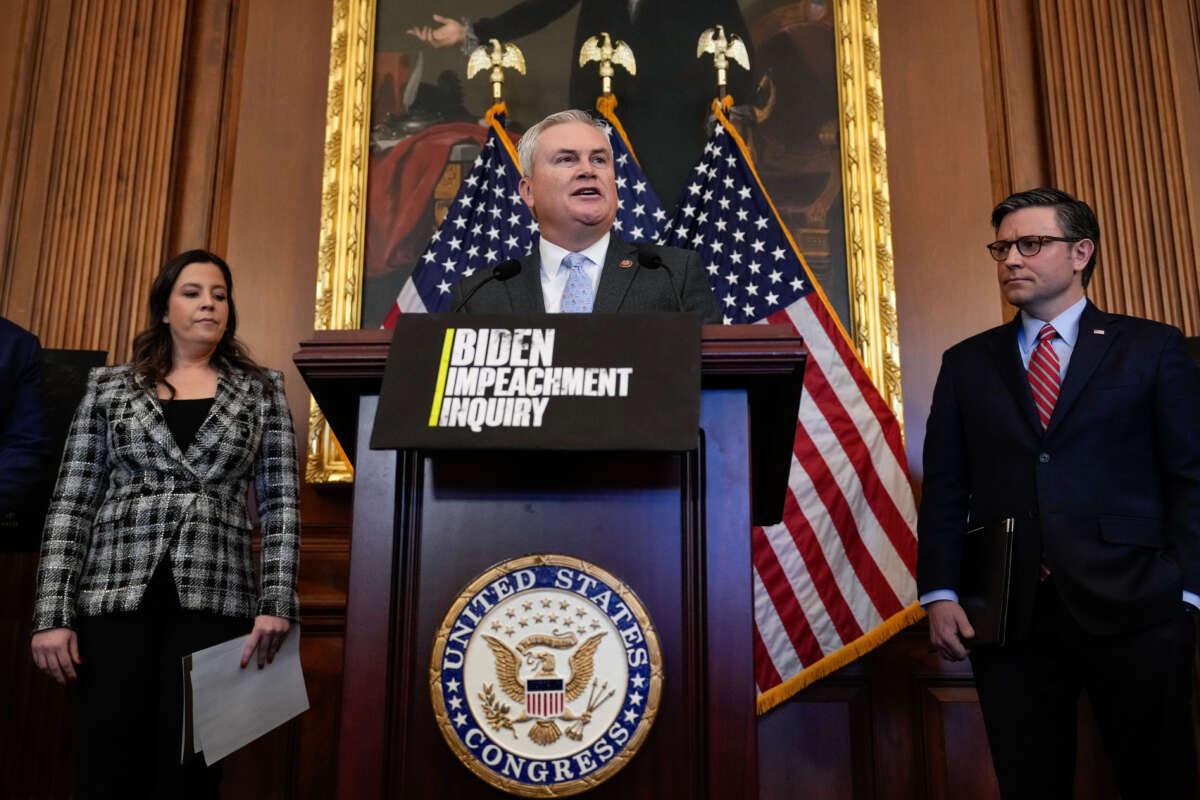House Republicans have unveiled a resolution to formalize the impeachment inquiry that began earlier this year against President Joe Biden.
The resolution directs three committees, which have already been investigating Biden for several months now, to “continue their ongoing investigations…into whether sufficient grounds exist for the House of Representatives to exercise its Constitutional power to impeach Joseph Biden.”
The document, if passed by the House, would give greater strength to subpoena requests and the scheduling of hearings made by the committees to investigate possible wrongdoings by Biden or his family members.
The impeachment inquiry itself is an extraordinary action — typically, more concrete evidence of a president’s wrongdoing is needed before leadership in the House agrees to move forward on impeachment. In the past, an inquiry was opened into former President Bill Clinton in light of evidence that he had lied under oath about an extramarital affair, and an investigation was opened into former President Donald Trump after he withheld military aid from Ukraine in order to procure political “dirt” on Biden from Ukraine to help his 2020 presidential campaign.
Technically, the House can impeach for any reason it believes falls into the category of “high crimes and misdemeanors,” which, when it was written into the Constitution more than two centuries ago, broadly referred to abuse of office, not actual crimes. However, it is typically seen as improper for Congress to seek impeachments for political reasons — indeed, there is evidence that suggests Republicans’ investigation into the president is simply an attempt to help Trump defeat Biden in the 2024 presidential election next year.
Notably, Republicans have failed to introduce any hard evidence within their present inquiry into Biden.
Multiple House members have said that the Biden impeachment resolution will be voted on sometime next week. The resolution will have to be passed by the House Rules Committee, likely on Tuesday, which means the earliest it could be heard and voted on by the full House would be Wednesday.
Earlier this week, while discussing the possibility of an impeachment resolution vote, Speaker of the House Mike Johnson (R-Louisiana) expressed confidence that the vote would take place and said it was necessary, claiming that the Biden administration and his family members were “stonewalling” the inquiry in its present form.
“The House has no choice, if it’s going to follow its constitutional responsibility, to formally adopt an impeachment inquiry on the floor so that when the subpoenas are challenged in court we’ll be at the apex of our constitutional authority,” Johnson said.
Johnson believes there are enough Republican votes to pass the resolution. In the narrowly divided House, if all members take part in the vote, 218 of the GOP conference’s 221 lawmakers would have to vote for the measure, assuming that all Democrats vote against it and no member of the House votes “present.” That would mean that only a few moderate Republicans — including those who won districts that went for Biden in 2020 — could vote against it.
A White House spokesperson has called the inquiry “baseless” and notes that many allegations made by Republicans alleging misdeeds by Biden “have already been thoroughly fact-checked and debunked.” The latest “findings” by House Oversight chair Rep. James Comer (R-Kentucky) seem to confirm the administration’s stance.
Comer claimed this week that the committee had obtained bank records indicating that the president’s son, Hunter Biden, received payments from companies linked with the Chinese government, after which he made direct payments to Joe Biden. Comer alleged that these actions amounted to a funneling of money from the Chinese government to the president.
However, the three payments the committee has found — $1,380 each — occurred in the fall of 2018, when Biden wasn’t in any public office. The payments have also been found to have been repayments for a loan Joe Biden had made to Hunter Biden for a vehicle he wanted to purchase that year but couldn’t due to having bad credit following a bout with drug addiction.
“Hunter’s father helped him when he was struggling financially due to his addiction and could not secure credit to finance a truck,” Hunter Biden’s attorney Abbe Lowell said about Comer’s allegations. “When Hunter was able to, he paid his father back and took over the payments himself.”
Several news agencies have reviewed emails between the Bidens confirming that the payments were for repayment of the car loan.
Trump is silencing political dissent. We appeal for your support.
Progressive nonprofits are the latest target caught in Trump’s crosshairs. With the aim of eliminating political opposition, Trump and his sycophants are working to curb government funding, constrain private foundations, and even cut tax-exempt status from organizations he dislikes.
We’re concerned, because Truthout is not immune to such bad-faith attacks.
We can only resist Trump’s attacks by cultivating a strong base of support. The right-wing mediasphere is funded comfortably by billionaire owners and venture capitalist philanthropists. At Truthout, we have you.
Truthout has launched a fundraiser to raise $34,000 in the next 5 days. Please take a meaningful action in the fight against authoritarianism: make a one-time or monthly donation to Truthout. If you have the means, please dig deep.
